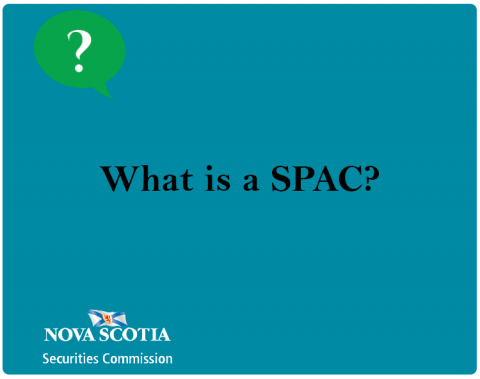Submitted by nsscadmin on

The term SPAC has come up a lot in media stories and social media posts on investing lately. That led to a reader wanting to know more about them and if they exist in Canada.
SPAC stands for special purpose acquisition company. It is formed to raise capital through an initial public offering (IPO) to finance the acquisition of another private company and take it public. At the time of the IPO, the SPAC does not reveal the company they plan to target for an acquisition with the funds. Because of this, a SPAC is essentially a publicly traded shell corporation or ‘blank cheque company’ that has no commercial operation.
At least 90 percent of the funds raised by a SPAC are set aside in liquid or low risk securities until the purchase of a company can be secured. There is a defined time frame during which this acquisition must take place, typically two to three years. If the acquisition is not completed during this time the funds that have been raised are liquidated and returned to investors.
In Canada, if a SPAC wants to be listed on the TSX it must raise a minimum of $30 million from at least 300 shareholders during its IPO. Also, at least 1 million freely tradable securities must be held by public holders and be issued for no less than $2 a share or unit. For other SPAC rules set by the TSX see their Guide to Special Purpose Acquisition Corporations.
A SPAC also must obey rules and regulations set by Canadian securities regulators. This includes filing a prospectus with securities regulators in every jurisdiction in which the SPAC and the resulting issuer will be a reporting issuer, assuming the completion of a qualifying acquisition. The SPAC must receive a receipt for the prospectus from all applicable securities regulators before its shares can trade.
There are several recent examples of U.S. based SPACS, including the largest-ever SPAC, Pershing Square Tontine Holdings Ltd. which raised $4 billion with its IPO in July, 2020. The acquisition for this record-setting SPAC has not been announced yet. Other notable SPACS include Virgin Galactic Holdings Inc. and Nikola Corporation. In the United States the SEC recently released a public statement on SPACs following an unprecedented surge in SPAC offerings and investments.
SPACs can be a cheap investment, usually selling at $10 per share or less during their IPO. However, they can also be a risky investment because you do not know what you’re investing in since you do not know what company the SPAC intends to acquire. If you’re interested in investing in a SPAC be sure to do your due diligence in the person or persons behind the SPAC. Are they knowledgeable and do they have a good financial history? Are you comfortable risking your money by backing this unknown venture? As with any investment, never invest more than you can afford to lose.
